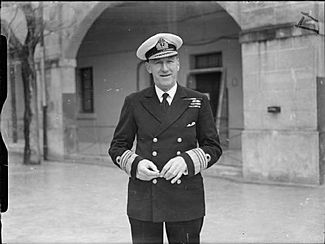Wilbraham Ford facts for kids
Quick facts for kids
Sir Wilbraham Tennyson Randle Ford
|
|
|---|---|

Admiral Sir Wilbraham Ford in 1943
|
|
| Born | 19 January 1880 Saint Helier, Jersey, Channel Islands |
| Died | 16 January 1964 (aged 83) |
| Allegiance | United Kingdom |
| Service/ |
Royal Navy |
| Years of service | 1894–1946 |
| Rank | Admiral |
| Commands held | Commander-in-Chief, Rosyth (1942–1944) Flag Officer, Malta (1937–1941) HM Australian Squadron (1934–1936) HMS Dryad (1930–1932) HMS Royal Oak (1929–1930) HMS Ganges (1927–1928) HMS Calliope (1924–1925) HMS Diligence (1922–1923) |
| Battles/wars | First World War Second World War |
| Awards | Knight Commander of the Order of the Bath Knight Commander of the Order of the British Empire Officer of the Venerable Order of Saint John |
Sir Wilbraham Tennyson Randle Ford (born January 19, 1880, died January 16, 1964) was a very important officer in the Royal Navy, which is the United Kingdom's navy. He became an Admiral. From 1934 to 1936, he was in charge of the Australian Navy's ships, known as His Majesty's Australian Squadron. He served in both the First World War and the Second World War.
Contents
Wilbraham Ford was born on January 19, 1880, in Saint Helier, a town on the island of Jersey in the Channel Islands. His father was Major C. W. Randle Ford.
He joined the Royal Navy as a cadet on January 15, 1894, when he was just 14 years old. He quickly moved up the ranks. A few years later, he became a sub-lieutenant, and then a lieutenant in 1902.
Commanding Ships and Training
As he grew in rank, Ford took command of several important ships and training centers.
Early Commands
- From 1922 to 1923, he commanded HMS Diligence.
- Between 1924 and 1925, he was in charge of HMS Calliope, which was part of the Atlantic Fleet.
Training and Sports Roles
In 1926, he worked at HMS President. He became the Director of Physical Training and Sports for a short time. Later, he was the commanding officer of HMS Ganges, a training center in Shotley. He was also the Captain-in-Charge of Harwich Docks from 1927 to 1928.
From 1929 to 1930, he commanded HMS Royal Oak. This ship was part of the Mediterranean Squadron. After that, he was promoted to lead HMS Dryad, which was a navigation school, from 1930 to 1932.
Leading the Australian Fleet
One of his big roles was being the Rear Admiral Commanding His Majesty's Australian Squadron. He held this position from April 1934 to April 1936. This meant he was in charge of the main group of Australian Navy ships. For his service, he received the Companion of the Order of the Bath award in 1934.
Malta and World War II
From 1937 to 1941, he was the Vice-Admiral-in-Charge of Malta Dockyard. This was a very important job, especially as the Second World War began. He was in charge of the naval base and its operations in Malta. During this time, he received more honors:
- The Officer of the Venerable Order of Saint John in 1938.
- The Knight Commander of the Order of the British Empire in 1940.
- The Knight Commander of the Order of the Bath in 1942.
Commander-in-Chief, Rosyth
From 1942 to 1944, he was transferred to be the Commander-in-Chief, Rosyth. This was another very important command during the war. He retired from the Royal Navy in 1946.
Personality and Legacy
A writer named Ġużè Ellul Mercer, who kept a diary during the war, described Wilbraham Ford in 1940. He said Ford was a "big man, built like a bastion," meaning he was strong and solid. He was always busy and never grumpy, unlike some other high-ranking officers.
Ford often wore simple khaki clothes without many medals, which made him look like a regular person. He enjoyed joking around with the workers, sometimes hiding their brooms or buckets and then laughing like a kid. He was known for teasing people and even trying to speak silly phrases in Maltese.
Despite his playful side, he was very strict with his English officers. He could be tough on them if they made mistakes. However, he was always kind and gentle with the lower-ranking workers. Ellul Mercer believed that as long as England had leaders like Sir Wilbraham Ford, they could win the war.
Sir Wilbraham Ford passed away on January 16, 1964.
 | Madam C. J. Walker |
 | Janet Emerson Bashen |
 | Annie Turnbo Malone |
 | Maggie L. Walker |

